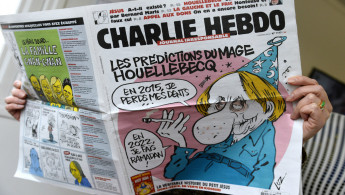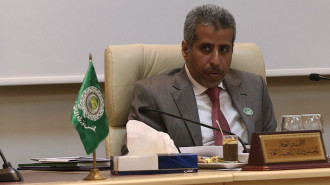Breadcrumb
Alain Gresh speaks out: What now for France?
The murder of 12 people in a terrorist attack on the Paris offices of a satirical magazine can only feed a misplaced idea of the Muslim threat to French values, according to the editor of Le Monde Diplomatique.
Alain Gresh told al-Araby al-Jadeed that Wednesday's attack on Charlie Hebdo magazine's offices would inflame an already tense situation for Muslims in France, and would be seized on by far-right parties such as the National Front to push their anti-Islam agenda.
"This horrendous act will not be seen to be just about terrorism but it will feed into the misplaced idea that Islam is a threat to our values, freedom of speech, women and so on," Gresh said.
"It is a very tense situation for Muslims in France right now, just as we are seeing across much of Europe. This attack could confirm the belief many people harbour, that Islam is a threat and Muslims are the enemy.
| The only political force that could benefit from this attack is the National Front |
"The only political force that could benefit from this attack is the National Front. They have abandonded their anti-Jewish and anti-Israeli rhetoric and directed it to Islam."
Hebdo has in recent years taken an anti-Islamic and anti-Palestinian stance in its satire. According to Gresh "it was not targeted by chance".
On the morning of the massacre the magazine published a cartoon mocking the leader of the Islamic State group, Abu Bakr al-Baghdadi.
Gresh however said that despite the French media being the target of the events on Wednesday, its influence in shaping opinions was often overstated.
"I am not worried that the media will exploit or inflame this situation and I will be trying to convey what I feel is important during these trying times but we can overstate our own influence sometimes.
"The reality is out there on the streets and the musings of people like me will only make so much difference."
Gresh cautioned against the introduction of tougher laws against radicalism in France, a response that many other countries have taken to attacks by extremist groups.
Towards the end of 2014, the French parliament enacted laws to stop citizens travelling to areas controlled by the IS group.
The legislation authoriseds travel bans on suspects, and allows for punishment on the basis of "assumed terrorism".
A bad move in Gresh's view.
"Like the Patriot Act in the US after 9/11, this is very bad. We have enough laws and it is creating an atmosphere of fear and Islamophobia."
He said the government of Francois Hollande would also use the attack to justify its policy against the Islamic State group, if the attackers were confirmed as being sympathtic to its cause.
France on Tuesday decided to send the Charles De Gaulle aircraft carrier and its fleet to the Gulf to support operations against the group, according to reports. The president is due to confirm the deployment in a speech on January 14, according to the military news site Mer et Marine.
Gresh however said violence in response to violence was not the answer. "I argue we are only going to increase the level of destruction there and create more problems for us here," he said. "We need political solutions but there is no real direction to this campaign."






![Anthony Blinken speech [Getty] Anthony Blinken speech [Getty]](/sites/default/files/styles/image_684x385/public/media/images/6263436E-8ACD-4D3C-9055-25A7BE79DD5A.jpg?h=d1cb525d&itok=fLHmHCRG)

![Hajj Saudi Arabia [Getty]](/sites/default/files/styles/image_330x185/public/2157179630.jpeg?h=a5f2f23a&itok=kuo1G9Hw)
![French President Macron [Getty]](/sites/default/files/styles/image_330x185/public/2192150629.jpeg?h=a5f2f23a&itok=_lRlOebg)